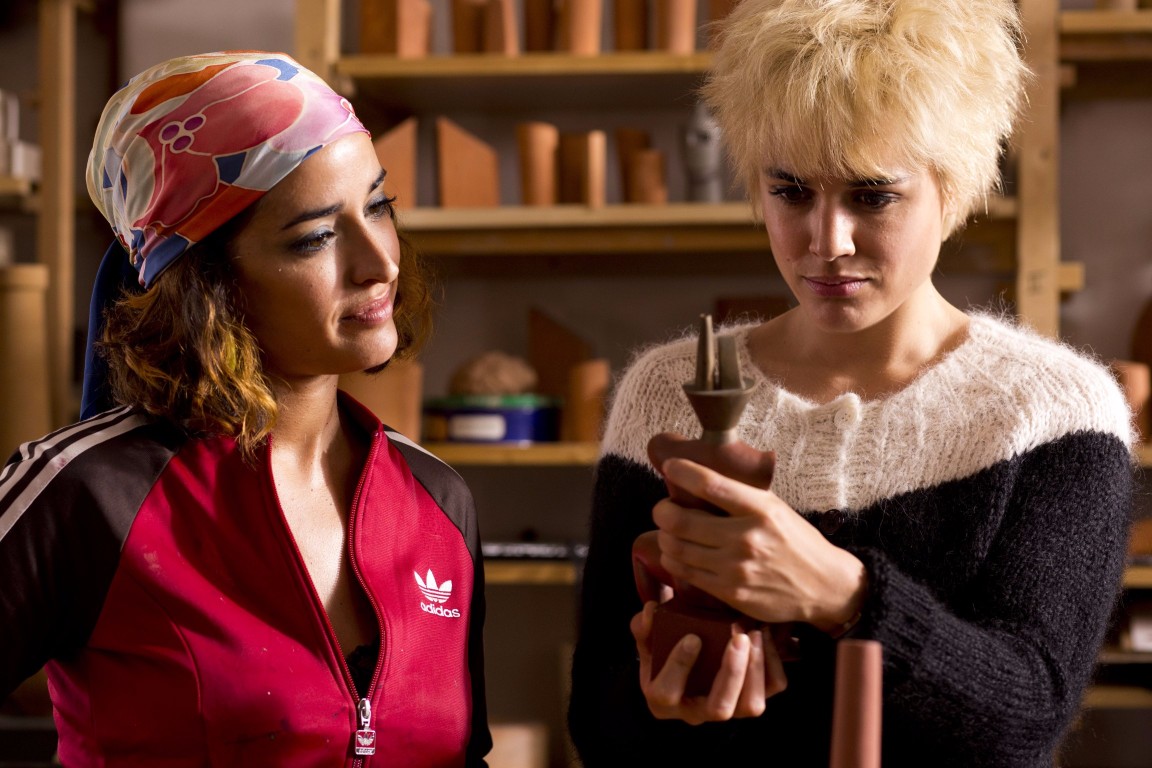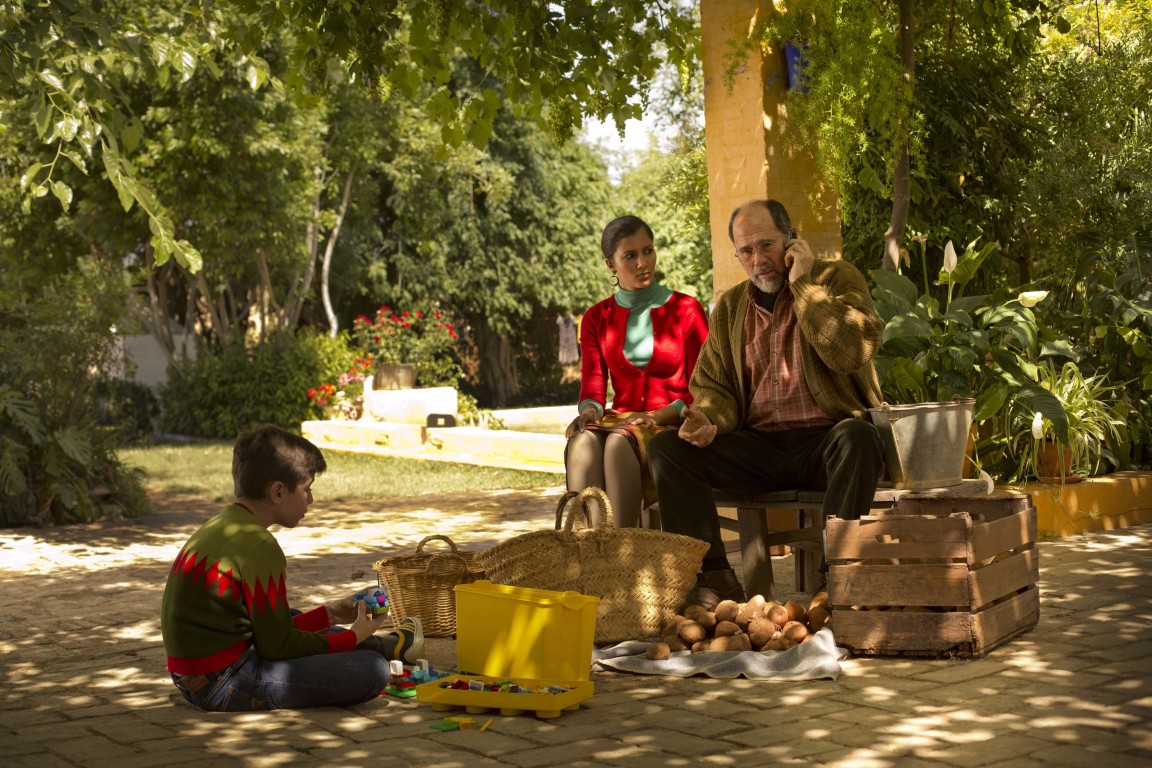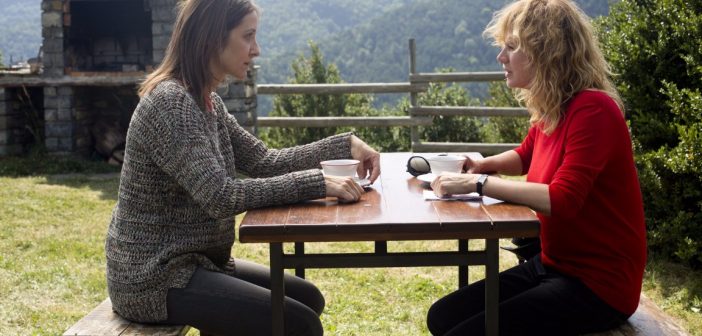Julieta is without question a classic Pedro Almodovar. This is the first film in 10 years from Spain’s most internationally successful director that returns to the form he is best known for and what he does best – family dramas focusing on the intricate relationships among women in the midst of complicated events, challenging as always to sum up in words. And like his early films, Julieta is full of the vibrant colours of his country–in this case with an added touch of Canada, as the movie is based on three short stories from Alice Munro’s Runaway.
Right from the florid, almost obscenely red pulsing fabric in the opening scene, one knows that like his early works, the film will at least provide a tourism board-worthy visual feast of Spanish flair even for the most critical viewer. (My fellow movie-goer gushed while watching, “I love the clothes!”) The red turns out to be a woman’s blouse, and it is how we are introduced to the title character Julieta, a middle-aged Madrileña who is packing up her belongings in preparation for a move to Portugal with her partner Lorenzo. She seems stately, but tired eyes hint at sadness within her. The plan to move, however, is thrown askew after a chance encounter with an old acquaintance on the streets of the Spanish capital.
The acquaintance is a young woman, Bea, former best friend of Julieta’s daughter Antia, whom we later find out has been estranged from her mother for years. Bea tells Julieta that she has recently bumped into Antia on a trip to Italy where the latter is now living with her kids. This discovery awakens the demons of a painful past Julieta has somehow managed to bury, or at least ignore over the years. This newfound knowledge about her daughter is enough for Julieta to immediately abandon Lorenzo and Portugal, and she moves to the old apartment where she lived with Antia in happier times, seeking to confront her past and the events that led to this.
As Julieta reminisces and starts to furiously write a journal addressed to Antia, we are taken back to her young, spunky teacher self who meets Antia’s father, Xoan, a fisherman, on a train. Following a disturbing sequence of events during the journey that leads to a night of passion with Xoan en route, she eventually ends up living with him happily on the Galician coast. One can almost hear a sigh in unison among the audience as we see a beautiful house right on the sea whose windows look out onto the deep blue (such lovely visuals from Almodovar as usual!).
When Antia is off to summer camp as a teenager, that peaceful idyll is punctured by tragedy in the form of Xoan’s death while fishing during a storm. Some years pass, and mother and daughter, who is the pair’s bastion of strength, seem to have gotten over his death – or have they? One day as a young adult, Antia leaves the house under the pretext of attending a spiritual retreat and “ghosts” Julieta, never to return, leaving her mother a heartbroken wreck. Why has Antia disappeared and how will Julieta go on from here? That, interspersed with a few narratives involving friends and family make up the rest of the story.
There is frequently a touch of the macabre in Almodovar’s films and Julieta is no exception. For a viewer going in cold without any prior inkling of the plot, composer Alberto Iglesias’ sinister score at the right moments leaves us teetering on the edge of suspense and what we think will be a horror story or something violent to come. Added to this is the constant presence of a strangely phallic sculpture, a gift from a friend, which entrenches itself in Julieta’s life over the years. But before we know it, we are then transported to warm Andalucia and its flamenco rhythms. Julieta is vintage Almodovar after all, and there are no phantoms or bloody murder, just a tangle of relationships, missteps here and tell-tale there, one after another leading to sad consequences and years of alienation.

Almodovar always adds a touch of the quirky or the macabre, such as this strangely phallic sculpture.
Almodovar uses two different actresses for the younger and older Julieta and both Adriana Ugarte and Emma Suarez deliver commendable performances. Antia, however, comes across as an aloof and fleeting presence. It is probably because of this and the relatively young age at which she makes her disappearing act that the audience is unable to feel the depth of Julieta’s pain. Mother and daughter never seemed particularly close-knit after Xoan’s death despite the fact that Antia is all Julieta has to live for.
As the film moves towards its conclusion, and with Almodovar there is always resolution, one expects a feel-good ending. But, this time round, he stops just short as his French counterparts are liable to do. Somehow, this leaves us missing the flan after a great gazpacho and paella, with the feeling that after a period of digression, the director has made a somewhat tentative return to his roots.

Like many of Almodovar’s earlier films, Julieta pulsates with colours and draws one to Spanish life.
Although Julieta does not have the compelling emotions we felt in Talk to Her, All About My Mother or Women on the Verge of a Nervous Breakdown, it is nonetheless still immensely watchable and and full of Spanish flavours – the film has been selected to represent Spain at the 2017 Oscars. It also leaves one considering a worthy question and not-unlikely occurrence in this age of easily-fractured relationships–What would one do if “ghosting” happens in the family context and someone close to you suddenly disappears without a trace one day?
Julieta is now showing in Shaw theatres.







